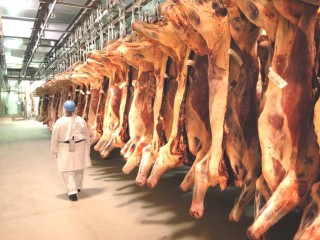 The Federal Government’s inclusion of red meat processing in direct carbon tax legislation threatens to create a distorted two-tiered structure which would unfairly discriminate against larger, more efficient processing facilities, investigations by Beef Central show.
The Federal Government’s inclusion of red meat processing in direct carbon tax legislation threatens to create a distorted two-tiered structure which would unfairly discriminate against larger, more efficient processing facilities, investigations by Beef Central show.
Calculations made this week indicate that the nation’s three largest beef processors could be forced to pay an additional $18 to $19 million in carbon-related costs, representing between $4 and $6 per head of cattle slaughtered.
That is based on the Government going ahead with current plans to divorce processors from agricultural carbon tax protection, and including them as potential ‘Top 500’ carbon emitters.
The imposition of a price on carbon emissions – initially as a fixed annual price of $23/tonne, then in the form of an Emissions Trading Scheme – will increase the cost of energy and energy-related products and services used by meat processors and livestock producers alike.
Initially the cost impact will only affect the heavy users of energy that generate more than 25,000 tonnes of carbon each year. However within a few years it is expected that fuel will likely be included which will greatly broaden the impact.
It has already been broadly recognised that for meat processors competing in the international market, given current exchange rates, most of those costs are likely to be passed back down the chain to the producer.
During the initial stages the carbon tax will have its greatest impact on meat processing. Utility bills are likely to increase by as much as 17pc, the Australian Farm Institute has calculated.
In the longer term however the policy is likely to present an increasing challenge for the whole supply chain as the carbon price is anticipated to increase 5pc-6pc annually and be imposed on more sectors of the industry over time, thereby increasing farm costs at a faster rate.
The first challenge for meat processors is whether the larger plants that emit in excess of 25,000 tonnes of CO2 under NGERS will be included in the top 500 emitters. If they are, it will introduce a distortion to the meat industry that would see some large plants operating within the scheme, paying the $23/t tax, and some outside. At this stage no one can tell specifically which plants will be on the ‘Top 500’ list.
Dinmore target
The nation’s largest red meat processor, JBS Australia, has calculated its annual carbon tax cost using currently available government information at $8 million a year.
The company’s flagship Dinmore facility will definitely exceed the Government’s 25,000t carbon threshold, and depending on production, the carbon scheme could also involve JBS Rockhampton, Townsville, Beef City and Riverina plants.
 During parent company, JBS SA’s recent second quarter results announcement, chief executive Wesley Batista specifically singled-out Australian Government fees and charges on AQIS inspection and carbon as a cause for considerable concern for the company’s Australian operations in trying to compete on the world stage.
During parent company, JBS SA’s recent second quarter results announcement, chief executive Wesley Batista specifically singled-out Australian Government fees and charges on AQIS inspection and carbon as a cause for considerable concern for the company’s Australian operations in trying to compete on the world stage.
“The fact is that JBS has a big investment in its Australian beef processing operations, and we see that economies of scale is being penalised under this proposed tax,” JBS Australia director John Berry said yesterday.
“The cost to operate is becoming higher and higher which is making it increasingly difficult to compete in international markets.”
While he had had recent discussions with Prime Minister Gillard and Agriculture Minister Ludwig, Mr Berry said he felt that the government still did not clearly understand that the processing sector was in fact ‘in the mix’ for the direct carbon tax.
“They may have thought that like agriculture, it was not going to be affected by the tax, in direct terms. However the Government currently defines agriculture as ending at the farm gate, whereas it is really a continuum, ending in beef in a box. The Government must look at removing meat processing from the scheme, because of the distortionary effects it presents.”
Mr Berry said based on seasons, killing numbers, weights and other factors, a number of other Australian processing companies had the potential to move into the 25,000t direct tax threshold.
That in turn could deter processing stakeholders near the margins from investing in development and greater efficiency, which would reduce the industry’s performance in the international meat market.
“The Government needs to think about the implications, both for jobs and investments in rural and regional Australia. These plants are very significant employers in their locations, and the distortionary effects will have implications,” he said.
“We are an energy-intensive business. But we are trade exposed, with export constituting the majority of our total production. The government fails to realise that meat processing is not like the coal or iron ore industry – we’re a business of very narrow margins, export oriented, and this clearly disadvantages Australia.”
Export competitiveness under threat: Nippon
 Nippon Meat Packers Australia director of sales, Stephen Kelly also holds grave concerns about Australia’s export competitiveness. He pointed out that each of the top three Australian meat processors exported about 80 percent of their annual beef output.
Nippon Meat Packers Australia director of sales, Stephen Kelly also holds grave concerns about Australia’s export competitiveness. He pointed out that each of the top three Australian meat processors exported about 80 percent of their annual beef output.
“The vast majority of that goes into countries which do not have a carbon tax, and our largest competition in those markets – South and North America – do not have a carbon scheme in place. It means Australian beef will be at a considerable disadvantage,” Mr Kelly said.
One of the frustrating aspects of the issue was that at this point, it remained ambiguous as to exactly how the carbon tax and offsets would be applied.
“Our company is working through the Australian Meat Industry Council to lodge a submission to the effect that red meat processing plants should be excluded,” he said.
“The big issue for us is that whatever the outcome, we cannot continue in this business if the big-end of town is being penalised, relative to the small-end of town. It’s potentially an inequitable situation where large processors are being penalised for being efficient. We are opposed to the carbon tax on that principle alone.”
“It seems that a lot of industries have been given offsets, and we believe that the impact on the meat industry has not yet been thought-through well enough by the Government,” he said.
Teys/Cargill entity racks up $7m in costs
 Teys Brothers general manager of corporate affairs, Tom Maguire, said the impact figure calculated by the merged Teys/Cargill entity was likely to be about $4 a head in indirect costs, including forecast rises in electricity, gas and coal, using conservative Treasury estimates.
Teys Brothers general manager of corporate affairs, Tom Maguire, said the impact figure calculated by the merged Teys/Cargill entity was likely to be about $4 a head in indirect costs, including forecast rises in electricity, gas and coal, using conservative Treasury estimates.
In addition, because the Lakes Creek plant near Rockhampton would exceed the 25,000t carbon threshold, becoming directly liable to pay permits, that would add another $2 a head. In total that could add-up to close to $7 million in additional cost across the merged entity’s 1.5 million head annual kill capacity.
Based on currently available information, Teys Beenleigh would not be permit-liable, but it is currently ‘very, very close.’
“That in itself may act as a deterrent for growth, and the stupid part of the carbon process as it applies to the meat industry is that it is a tax on efficiency,” Mr Maguire said.
“It says if you get larger and more efficient through economies-of-scale then the government is going to tax you. It’s inequitable and will definitely create significant economic damage.”
Mr Maguire said the Government appeared to have no understanding in this particular area of how the industry operated.
“There may be nothing deliberate in it, but it’s an unintended consequence of how the scheme has been structured. They just have not thought it through,” he said.
“Until there is a global price on carbon, which is a very long way off, our international customers are not going to pay this bill, which means it must be borne by the Australian cattle producer.”
Is mitigation the answer?
Are there implications for Australia in a recent decision by the Canadian Government to provide $10 million in support to Cargill Beef for carbon mitigation work at its High River, Alberta beef processing plant?
There have been some recent examples of state government support for processing businesses in environmental actions. Cargill Beef at Wagga is understood to have recently received NSW State Government funding for odour control issues, part of the solution for which included some of the carbon-reducing technologies that now exist.
JBS’s John Berry said if the Government thought that programs to try and offset the 25,000t of carbon generated by some processing plants was part of the solution, then there would be ‘very significant dollar contributions’ required to develop programs like covering ponds to capture methane.
“But we do not see it as an ‘either or’ situation where the tax is acceptable if it is offset with subsidy for mitigation,” he said.
Nippon’s Stephen Kelly said if the move to a full scheme was to occur, the Government would have to be able to make the transition period for those companies affected occur with minimal impact.
Teys’ Tom Maguire said while the Government had recognised that while there were problems attached for processing, it had indicated that ‘there would be something in the packages in terms of assistance in introducing measures to reduce emissions to help processors out.’
“That’s a generic response that has no detail or real meaning at this stage,” he said.
Mr Maguire said there was no evidence that mitigation strategies like recovering methane gas from anaerobic waste water ponds to generate electricity could not be justified on any commercial basis.
“Clearly if there was an industry good or a community good in that, we would have already gone to the government seeking some assistance to implement it. The processing sector is always looking for ways to reduce costs or improve efficiency, but it has to be done on a commercial basis,” he said.



HAVE YOUR SAY